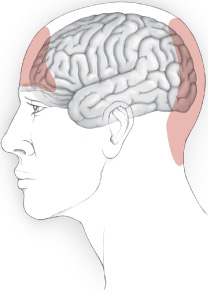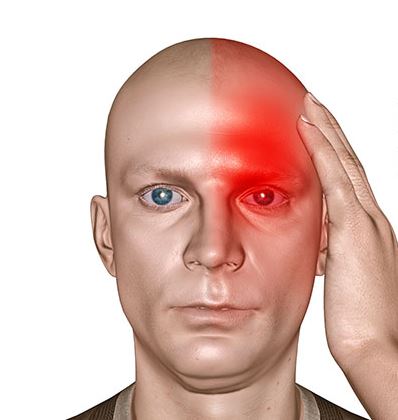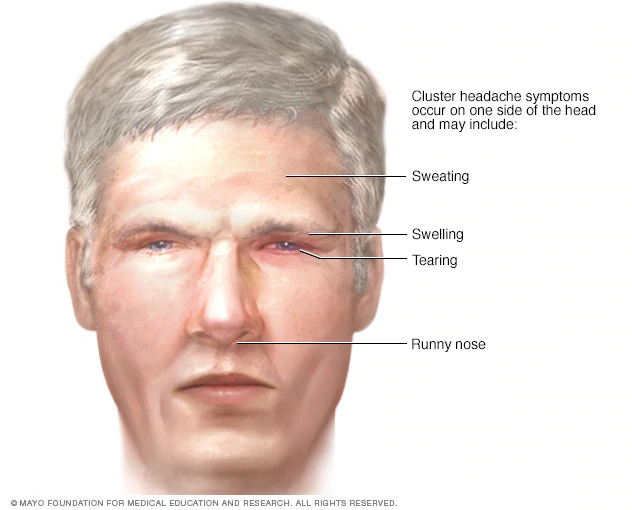What causes headaches?
Headaches are caused by a number of different things which fall into two general categories.
Tension headache
This type of headache often results from contraction of head and neck muscles. This may cause traction and irritation to the blood vessels around or in the head or to the meninges (the outer covering of the brain and spinal chord).
It is the most common form of headache and accounts for 70 per cent of headaches. It can occur in people of either sex and at any age but it is most common in adults and adolescents.
Tension headache usually occurs in isolated incidents but can become chronic for some people. Possible causes of muscle contraction associated with tension headaches include poor posture, stress, fatigue, eye strain, tobacco and alcohol use, and hormonal changes in the menstrual cycle.
Headaches of this type are often called cervicogenic headaches, because they often involve tension of the muscles in the neck.


Migraine headache
Migraine is the cause of about 20 per cent of all headaches. According to mid-20th century research this type of headache occurs when blood vessels of the head and neck constrict, resulting in a decrease in blood flow to the vessels.
More modern research suggests that a complicated series of neural and vascular events are to blame; in chronic sufferers a state of over-excitability may occur in the nerves of the occipital cortex, at the back of the brain.
Migraine is usually experienced as a throbbing pain on one side of the head with an associated feeling of sickness and sensitivity to light and sound.
Migraines are known to affect more women than men and are often chronic. Below are some of the factors that have been identified as being associated with migraines
- family history of migraine.
- prolonged muscle tension and stress
- alcohol use.
- exposure to tobacco smoke.
- poor sleep
- for women, menstrual periods and the using oral contraceptives
- certain foods such as chocolate, nuts and fermented or pickled condiments, as well as foods containing the amino acid tyramine (mature cheese, red wine, smoked fish) and foods containing preservatives and artificial sweeteners.
Cluster Headaches
These violent “suicide” headaches have been called the worst pain known to humankind. Affecting 0.1% of the population, men more than women, they are called ‘cluster’ because they occur in periods, with spontaneous remissions. Like migraines they tend to be one-sided, but usually don’t last so long (15 minutes to a few hours). They can be confused with trigeminal neuralgia, though this is normally felt in the face.
Cluster headaches are often treated as a medical emergency because of their severity, and because of the risk of suicide from the pain. More…

What are the symptoms of tension and migraine headaches?
Tension headache
- Pain is often felt in the generalised area of the head and neck as opposed to on one side.
- Pain may also be situated in the back of the head and neck and feel like a ‘tight band’.
- Sometimes accompanied by muscle tightness in back of neck.
- Of relatively short duration if treated in time.
Migraine headache
- Throbbing, pulsating feeling usually worse on one side of the head.
- Pain may be dull or severe and often begins in the morning, gradually worsening in an hour or so.
- Pain may be accompanied by other symptoms such as nausea, vomiting, vertigo-like feeling and visual disturbances.
- Sensitivity to loud noises and light.
- Commonly lasts from a few hours to one or two days in some cases.
What can you do to help yourself?
If your practitioner has examined you without finding any serious cause for the headaches, these tips should prove helpful
- avoid excessive use of alcohol and tobacco.
- engage in correct posture while sitting and working. The type of chair you use is important. It should be one that maximises comfort and good posture and may need to be adjusted to suit your needs.
- perform relaxation techniques on a consistent basis.
- get plenty of fresh air and exercise.
- some people find that taking the natural herbal treatment Feverfew is very effective at reducing or preventing their headaches occurring. This needs to be taken daily ? even if no headache is present ? to have an effect. Consult your GP before starting this.
For migraine headaches, symptoms may be reduced by
- resting in a quiet room with the lights turned off.
- avoiding food or drink in your diet that have been identified as possible triggers.
References
B Rasmussen. The epidemiology of headache. Cephalgia 1995; 15:45-68.
M Ferrari. Migraine. Lancet 1998; 351: 1043-51.

Osteopathic treatment
This normally focuses on the structural elements of the problem: looking at and alleviating tension in the muscles of the neck and shoulders, as well as around the base of the skull and the jaw. We would also examine the posture and look at any imbalances in the body caused by growth, work, illness, injury or habit. A lot of these things can be modified, if not eradicated.